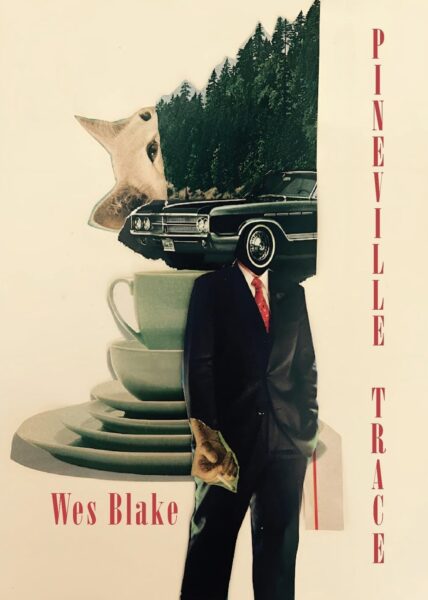
Reviewed by A W Earl
Pineville Trace by Wes Blake is a novella-in-flash following former revival preacher, and confidence man Frank Russet after his escape from minimum security prison. Through a series of interconnected short pieces, Blake creates a picture of a man who is himself fragmented, viewed in a number of flashes against the slowly shifting background of the North American continent, each chapter focusing in with the intensity of flash upon an image or an event, but coming together to form a larger narrative that is dappled, as though seen through leaves.
This was an utterly compelling read. Blake’s prose is sparse and simple, whose short, almost broken, sentences sing with enormous power. The constraints of the form he has chosen require a degree of repetition – of image, of explanation – but rather than dragging the narrative down, it instead creates a circling poetry where certain images emerge in increasing meaning and depth: the feeling of cedar boards, the scent of pine, a young woman with dark hair. This is a story, or series of stories, told from outside the perspective of human time – the turn of the seasons, the quality of light are pivotal, but the concepts of past and present become meaningless as Frank himself emerges as a haunted landscape, across whom these images and emotions move.
Magic seemed effortless. But it was not. It was always planned. Honed. Carefully. One emotion built on top of another. Energy built in such a way that it would transform into belief.
Frank is a confidence man, and we see the instinctive ease with which he uses those skills to escape, to survive, to get the things he needs – yet Frank himself has become only a conduit, all his abilities overlying a great hollowness. As he journeys across the North American continent, the reader is shown cities, rivers, landscapes, people – both real and visualised. Frank possesses the power to imbue these places with what he needs, seeks, or expects from them, his ‘magic’ guiding him right every time – but he seems to work the trick despite himself, bringing himself what he needed, or believed he sought, but unable to inhabit it.
In the absence of the observer, or observed only by the natural world, he is lost – can exist only in a present which is unstable about him – whether that is projecting forward in spiritual journeying, visions of the future and past, or losing himself in the bottle.
Frank remembered when the magic changed. It wasn’t that it went away. It was worse than that. The magic still worked. People still believed. Maybe more than ever. But Frank couldn’t feel anything anymore.
There are places where the two forms – novella and flash fiction – pull against each other. This is not an urgent, or a dynamic read, and while I found the circling poetics of repetition bewitching in the service of a longer whole, other readers may not find it so. Similarly, from a perspective of flash, while many of the individual chapters are remarkably strong, others would struggle to stand alone outside of the wider context. However, Blake does a remarkable job of inhabiting this tension between the forms and uses the limited, economic nature of flash to intensify the reader’s awareness of the lacunae in Frank’s past and present, as well as those in his soul.
For me, the heart of the work lies in a story told to Frank by a First Nations man, of three warriors who ask the Great Spirit for gifts. The first two ask for normal, human desires, but the third:
“Thinks for a long time. What does he want? Long time he thinks. Finally, he says.” Joe’s cigarette flashed bright red as he inhaled. “I want everything.” Joe exhaled his cigarette smoke into the lantern’s light. “And I want to live forever. Great Spirit gets angry. This man wants too much.”
This is the hollow heart of Frank’s magic, and provides a powerful indictment of the American Dream – what does one become if one can embody and enact all of one’s desires? Blake’s answer to this is captivating, sophisticated, and utterly haunting.
Pineville Trace (140 pages) by Wes Blake is available for pre-order HERE. Pineville Trace is the winner of the Etchings Press Book Prize 2024.
__________________________
 A W Earl is a poet, novelist, and storyteller. They studied English Literature with Creative Writing at the University of East Anglia and hold an MA in Medieval and Early Modern Textual Cultures. They have written for the LGBTQ+ crowdfunding platform Pride Pocket, and their work has appeared in Bloodbath Literary Zine, Lighthouse Journal, and The Selkie. They were a judge for The Dracula Society’s 2021 Children of the Night Award, and Time’s Fool, their debut novel, was published by Unbound in 2018.
A W Earl is a poet, novelist, and storyteller. They studied English Literature with Creative Writing at the University of East Anglia and hold an MA in Medieval and Early Modern Textual Cultures. They have written for the LGBTQ+ crowdfunding platform Pride Pocket, and their work has appeared in Bloodbath Literary Zine, Lighthouse Journal, and The Selkie. They were a judge for The Dracula Society’s 2021 Children of the Night Award, and Time’s Fool, their debut novel, was published by Unbound in 2018.

 The SmokeLong Grand Micro Contest (The Mikey) is now an annual competition celebrating and compensating the best micro fiction and nonfiction online.
The SmokeLong Grand Micro Contest (The Mikey) is now an annual competition celebrating and compensating the best micro fiction and nonfiction online.